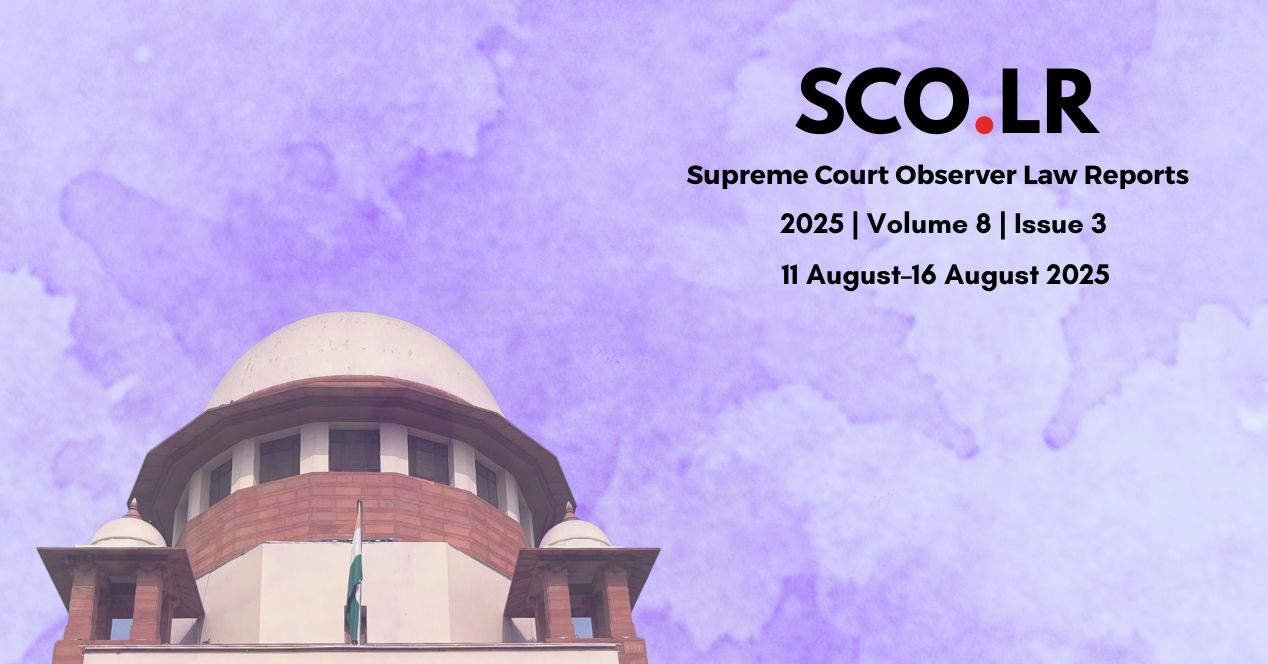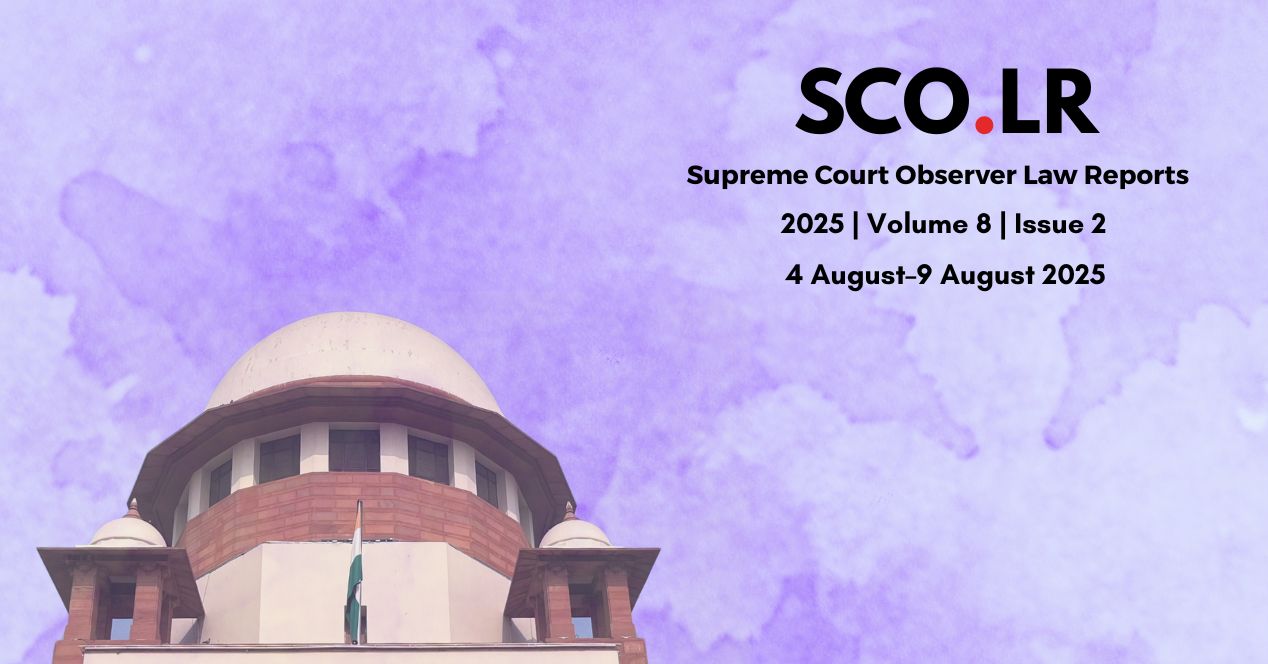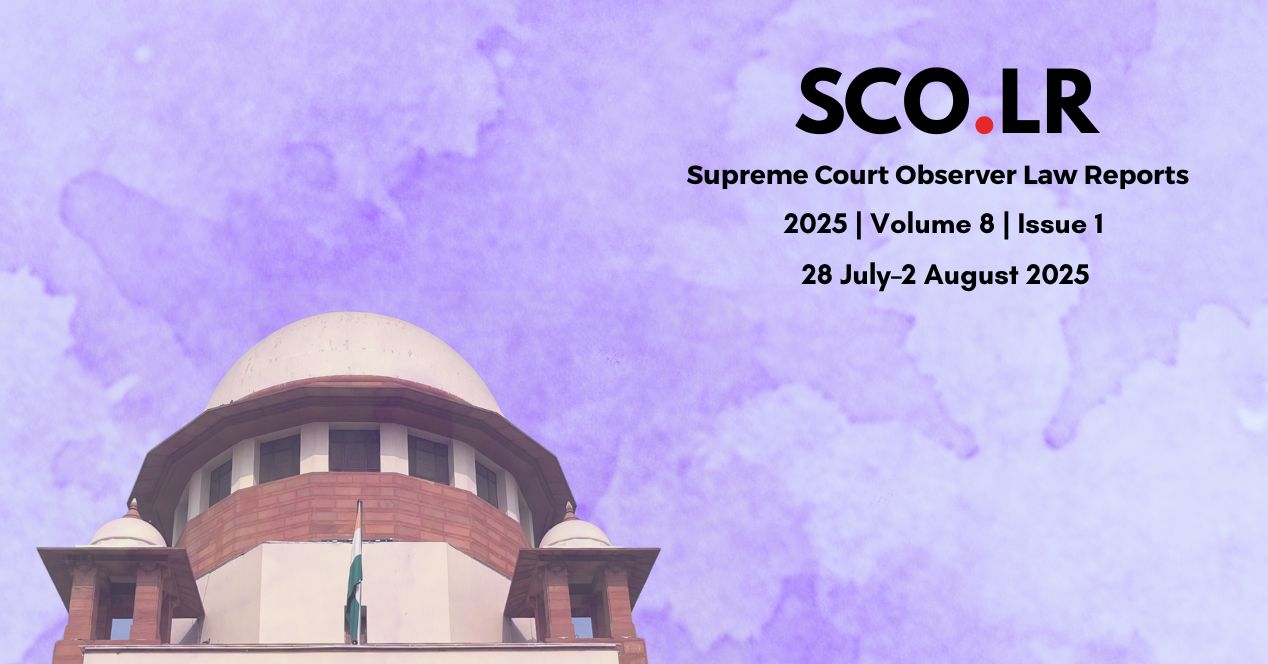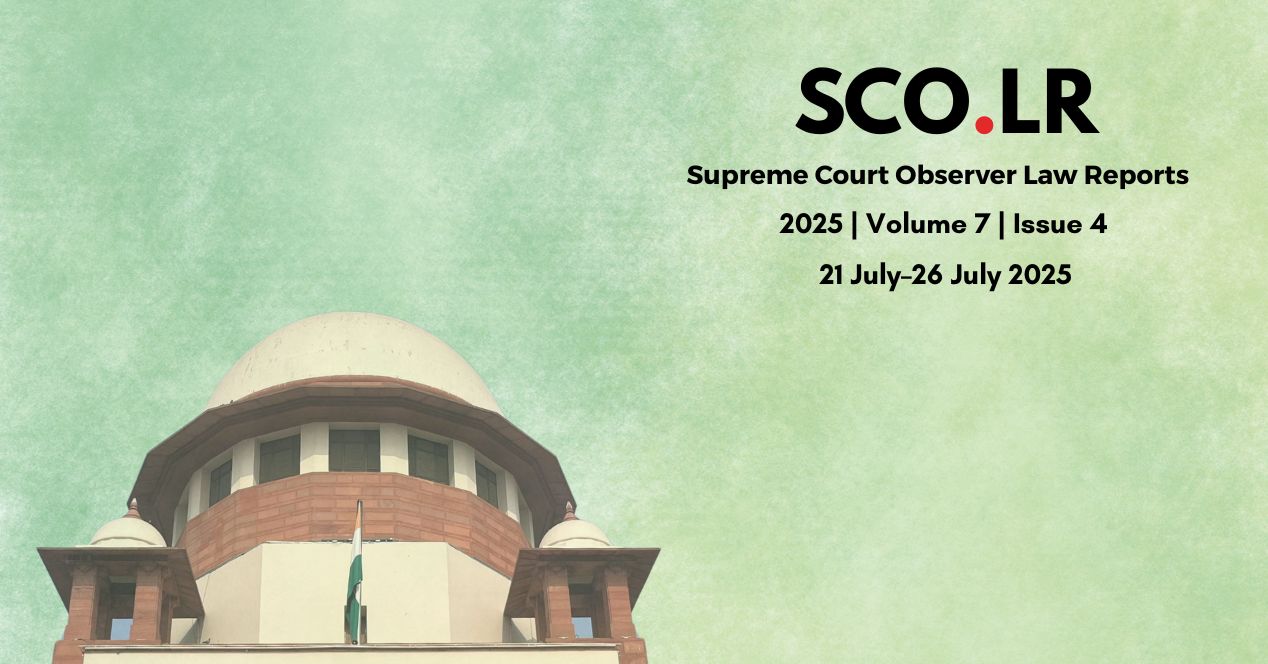Analysis
SCO.LR | 2025 | Volume 8 | Issue 4
In this Issue of SCO.LR, we bring you five important judgements from 18 August to 23 August 2025
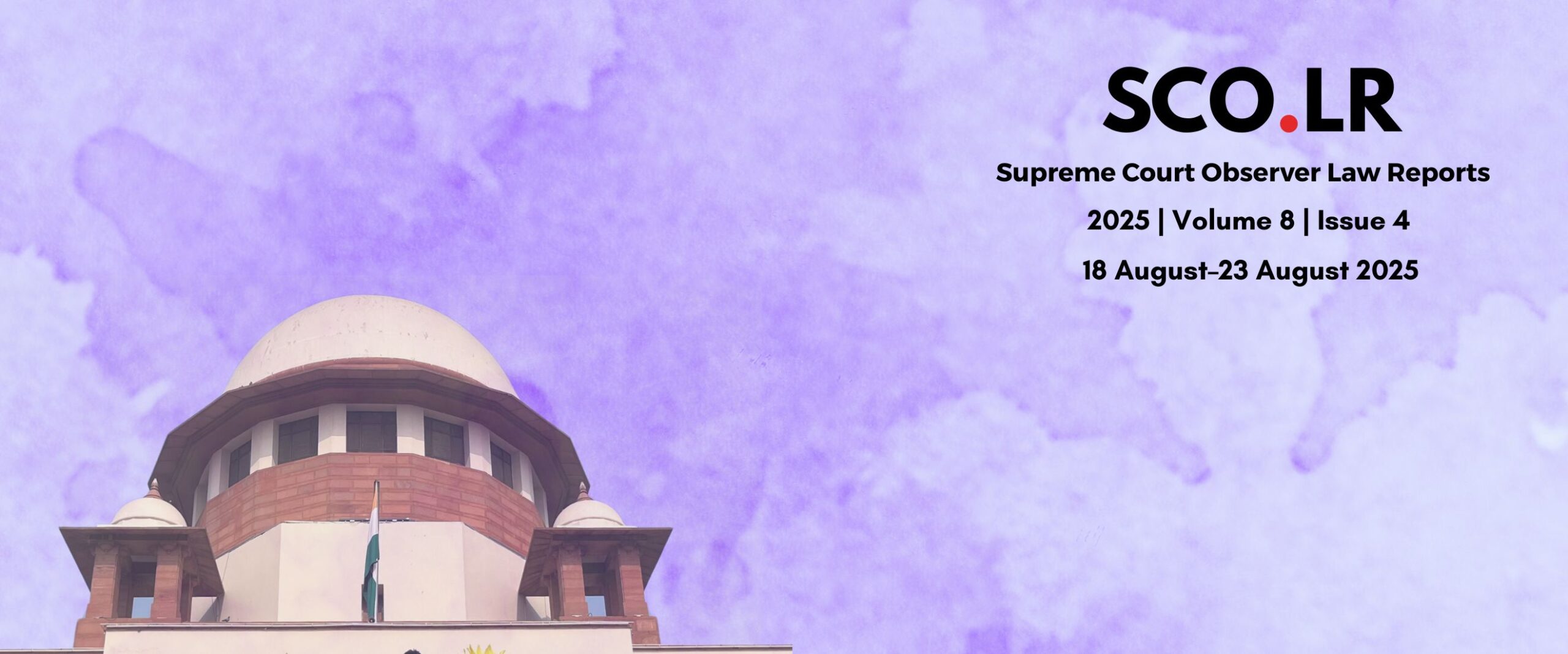
Volume 8, Issue 4 of the Supreme Court Observer Law Reports (SCO.LR) is here. In this Issue, we bring you five key judgements released by the Supreme Court in the third week of August.
These judgements cover topics such as the rights of legal heirs to continue an appeal, the rules on regularising ad hoc employment, the considerations in determining alimony in divorce cases, obstruction of public functions and the extent to which criminal orders can be rectified.
Don’t forget to read all judgements in clean and easily copyable HTML versions on our page here.
**********
The Supreme Court Observer Law Reports
SCO.LR | Volume 8 | Issue 4
18 August–23 August 2025
**********
Right of Legal Heirs to Continue Appeal
Khem Singh (D) Through LRs v State of Uttaranchal
31 July 2025 (uploaded on 22 August 2025)
Citations: 2025 INSC 1024| 2025 SCO.LR 8(4) [16]
Bench: Justices B.V. Nagarathna and K.V. Viswanathan
The Supreme Court held that an aggrieved party’s right to appeal can be carried forward by their legal heirs.
A Sessions Court in Haridwar had convicted three persons, accused of murder and causing injury during a dispute. The High Court acquitted three accused who were sentenced to life imprisonment. Khem Singh, who had moved the Supreme Court against the acquittal, died during the pendency of the case. His son, Raj Kumar, moved the Court to be substituted in his place in the legal proceedings.
The Supreme Court allowed the substitution and remanded the case to the High Court. It held that the expression “the right to prefer an appeal” in Section 372 of the Code of Criminal Procedure, 1973, (CrPC) meant the appellant has the right to actively pursue it until a final order is passed. Further, the expression “victim” under Section 2(wa) of the CrPC included a guardian or the legal heir of a victim.
Keywords/phrases: Code of Criminal Procedure, 1973—Section 372—right to prosecute—right to prefer an appeal includes legal heirs—substitution allowed
Read the Judgement here.
Mind map**********
Determination of Permanent Alimony
M.V. Leelavathi v Dr.C.R.Swamy
18 August 2025
Citations: 2025 INSC 994| SCO.LR 8(4)(17)
Bench: Justices Vikram Nath and Sandeep Mehta
The Supreme Court held that while determining alimony, courts must balance the husband’s capacity to pay with the wife’s long-term security.
The Family Court had granted the wife Rs. 15,00,000 as permanent alimony and Rs. 10,000 as monthly maintenance from her husband. The Karnataka High Court had upheld the alimony and increased the monthly maintenance to Rs. 25,000. The wife then moved the top court.
The Supreme Court assessed the income, profession and level of education of both parties. The Bench noted that the husband, a doctor, was in a position to pay more. However, though presently unemployed, the wife was not in a stage of complete “economic hardship” as she had M.Tech and LLB degrees. Emphasising that determining alimony must be a balanced approach, they ordered that Rs. 50,00,000 be paid as a one-time settlement, to secure the wife’s future with a commensurate standard of living.
Key words/phrases: Hindu Marriage Act, 1955—Section 24—Maintenance—divorce on ground of cruelty—balanced approach in determining alimony—permanent alimony enhanced
Read the Judgement here.
Mind Map**********
Prolonged Ad-Hoc Engagement of Daily Wagers is Unconstitutional
19 August 2025
Citations: 2025 INSC 998| 2025 SCO.LR 8(4)[18]
Bench: Justices Vikram Nath and Sandeep Mehta
The Supreme Court held that denying long-serving workers regular employment is violative Articles 14, 16 and 21.
Dharam Singh and others were engaged as daily-wage employees at the Uttar Pradesh Higher Education Services Commission (UPHESC) between 1989 and 1992. Despite continuous service for decades, their plea for regularisation of employment was rejected by the state government on the grounds of financial strain. The High Court rejected their plea on the ground that they were engaged only as daily-wage workers and that there were no rules for regularisation of employment in the UPHESC. Further, no sanctioned vacancies existed.
The Supreme Court quashed the state’s refusal to regularise employment as arbitrary and unsustainable. The Court reiterating that outsourcing and “ad-hocism” cannot replace fair public employment and directed that Dharam Singh and other employees be regularised with effect from 24 April 2000.
Key words/phrases: Constitution of India—Article 14—Article 16—Article 21—regularisation of daily wage workers—ad-hocism—employment regularised
Read the Judgement here.
Mind Map**********
Direct Cognisance of Offences Involving Obstruction of Public Servants
Devendra Kumar v State (NCT of Delhi)
20 August 2025
Citations: 2025 INSC 1009 | 2025 SCO.LR 8(4)[19]
Bench: Justices J.B. Pardiwala and R. Mahadeven
The Supreme Court held that a Magistrate must take direct cognisance of a case under Section 204 of the Code of Criminal Procedure, 1973 (CrPC) when a public servant is obstructed from performing their duty if the complaint is filed by the public servant themselves. A separate police investigation is not always necessary.
A process server had alleged that police officials and petitioner Devendra Kumar misbehaved with him while he was serving a warrant. The civil judge under whom the server worked filed a private complaint against the police officials under Section 186 of the Indian Penal Code, 1860. The Chief Metropolitan Magistrate (CMM) directed a police investigation under Section 156(3) of the CrPC, which Devendra Kumar challenged. The Delhi High Court dismissed his plea.
The Supreme Court held that the CMM wrongly directed a police investigation under Section 156(3) of the CrPC, as the judge is a public servant. Instead, the CMM should have taken immediate cognisance of the matter under Section 204 of the CrPC.
Key words/phrases: Indian Penal Code, 1860—Section 186—Code of Criminal Procedure, 1972—Section 195 and Section 204 —civil judge—obstruction of public function—complaint by public servant—direct cognisance by Magistrate
Read the Judgement here.
Mind Map**********
Recall of Criminal Orders Beyond Clerical Errors Impermissible
20 August 2025
Citations: 2025 INSC 1020| 2025 SCO.LR 8(4)[20]
Bench: Chief Justice B.R. Gavai and Justice A.G. Masih
The Supreme Court held that under Section 362 of the Code of Criminal Procedure, 1973, a judgement once signed cannot be altered or reviewed, except to correct clerical or arithmetical mistakes.
The Khosla Group filed a company petition at the Company Law Board (CLB) against the Bakshi Group after a dispute over a resort project in Kasauli. The Khosla group had filed a separate petition alleging perjury at the Delhi High Court. In 2014, the Supreme Court directed that the High Court could not hear the matter and it had to be decided by the CLB/NCLT. The petition was disposed of by the High Court in 2018 after the top Court’s direction. Despite this, the Khosla group filed another perjury plea at the High Court in 2019. The High Court initially declined to intervene but later recalled its 2018 Order after learning that the company petition had been withdrawn.
The Supreme Court held that the High Court’s recall was an impermissible review under Section 362 CrPC and set it aside. It stated that a recall “undermines the finality of the judicial proceedings.”
Key words/phrases: Code of Criminal Procedure, 1973—Section 362—finality of judgement—limited scope of Court—bar on alteration of judgement once signed
Read the Judgement here.
Mind Map
